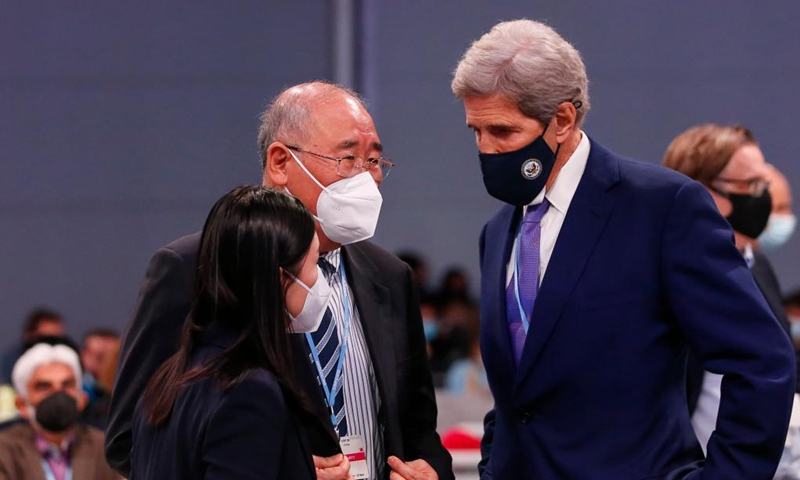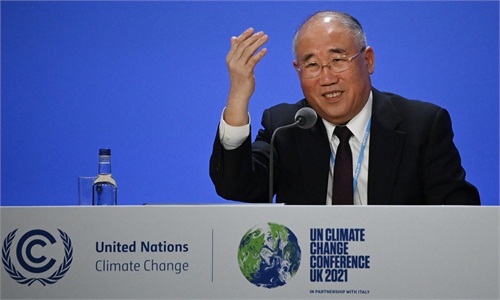
Xie Zhenhua (C), China's special envoy for climate change, speaks with John Kerry (R), U.S. special presidential envoy for climate, during the 26th session of the Conference of the Parties (COP26) to the United Nations Framework Convention on Climate Change in Glasgow, the United Kingdom, Nov. 13, 2021.Photo: Xinhua
Nearly 200 countries seized humanity's "last and best chance" at the COP26 climate summit, during which they reached an agreement to curtail the worsening impact of carbon emissions on the climate, including keeping the all-important goal of 1.5 C alive.
Climate scientists hailed the "unprecedented determination of tackling global warming" demonstrated by summit participants, especially developing countries including China and India, as not only underscoring the urgency of the climate issue, but also a stimulus for developed countries to match their promises with actions.
The curtain has fallen on COP26, but nations' race to meet their targets has just begun, and scientists warned countries not to put posture over substance, saying that countries trying to apply a one-size-fits-all approach and forcing developing countries into unrealistic pledges won't succeed.
Global negotiators signed a historic Glasgow Climate Pact on Saturday night to strengthen their 2030 emissions reductions targets by the end of 2022, and asked rich nations to "at least double" the amount of money they give developing countries to adapt to climate change.
The final text commits the 197 parties to the Paris agreement to "phase down" unabated coal power and "phase out inefficient fossil fuel subsidies."
The announcement came several hours after the scheduled Friday evening deadline.
When the deal was struck, China Special Envoy for Climate Change Xie Zhenhua told reporters, "We have a deal," and gave a thumbs up sign.
China's Ministry of Ecology and Environment issued a statement on Sunday, saying COP26 has been "concluded smoothly," and a new journey for the international community to deal with climate change had begun.
During the summit, the Chinese delegation actively participated in negotiations with all parties, said the ministry's statement, noting that China insists all parties have common but differentiated responsibilities, and all countries should stick to their own Nationally Determined Contributions (NDCs).
It asked developed countries to further honor their financial promises to developing countries.
All participants of COP26, especially developing countries, have demonstrated unprecedented ambition and determination to tackle climate change, Pan Jiahua, director of the Institute for Urban and Environmental Studies at the Chinese Academy of Social Sciences, told the Global Times.
He cited India as an example of a country with a relatively low income, which vowed a target of net zero greenhouse gas emissions by 2070. "It's almost a mission impossible for India, which relies on coal for 75 percent of its electricity," said Pan, praising India for showing "valuable determination."
However, this determination was played down by Western media as they began to chide China and India for weakening coal pledge. In the last-minute change the coal commitment was changed from "phase out" to "phase down."
Pan said that with the proportion of coal in its total energy consumption mix being more than twice the world's average, China faces a much more complicated situation in phasing out coal consumption than developed nations.
In some European Union countries, the proportion is insignificant or even close to zero.
"Developing countries such as China and India are not on the same starting line as Western countries, thus it is unfair to apply a one-size-fits-all approach to ask us to stop using coal altogether," Pan explained, noting that the change of wording actually shows that China will rigorously stick to its promises made on COP26, "so it strives to make sure the deal is feasible for China in the near future."
In contrast, climate analysts pointed out Western countries' hypocrisy in agreeing to at least double their financial assistance to developing countries, considering they are still lagging behind in meeting the $100 billion climate fund pledge, a key part of the 2015 Paris Agreement.
Xu Huaqing, a senior expert from the Chinese delegation and director at the National Center for Climate Change Strategy and International Cooperation, said in an exclusive interview with Global Times last week that $100 billion should also be a starting point for developed countries to further sustainably increase the funding of climate actions to help developing countries in their efforts and improve the traceability as well as the transparency of climate funds.
Setting an example
During this widely-watched summit, a joint declaration between China and the US that agreed to accelerate its phasing down of coal this decade surprised the world.
The joint declaration between Beijing and Washington injected much-needed stability into COP26, Li Shuo, Senior Policy Advisor at Greenpeace East Asia, told the Global Times.
He hailed the two countries' cooperation on the climate issue as laying a political foundation for the conference's breakthroughs, and setting an example for the international community on how to cast aside differences and push forward multilateral cooperation.
After the joint declaration was announced on Thursday, UN Secretary-General Antonio Guterres tweeted that he welcomed the agreement between China and the US to work together to take more ambitious climate action in this decade. "Tackling the climate crisis requires international collaboration and solidarity, and this is an important step in the right direction," he said.
Pan said that the curtain has fallen on COP26, it is now time for countries to race against time to realize their promises. "Countries' ambitious pledges on COP26 underscore the urgency of tackling global warming, and of our actions, cooperation and respect for common but differentiated responsibilities," he said, warning that any shirking of responsibilities, political bickering and selfishness would deter the world from seizing the last chance of reversing global warming.




